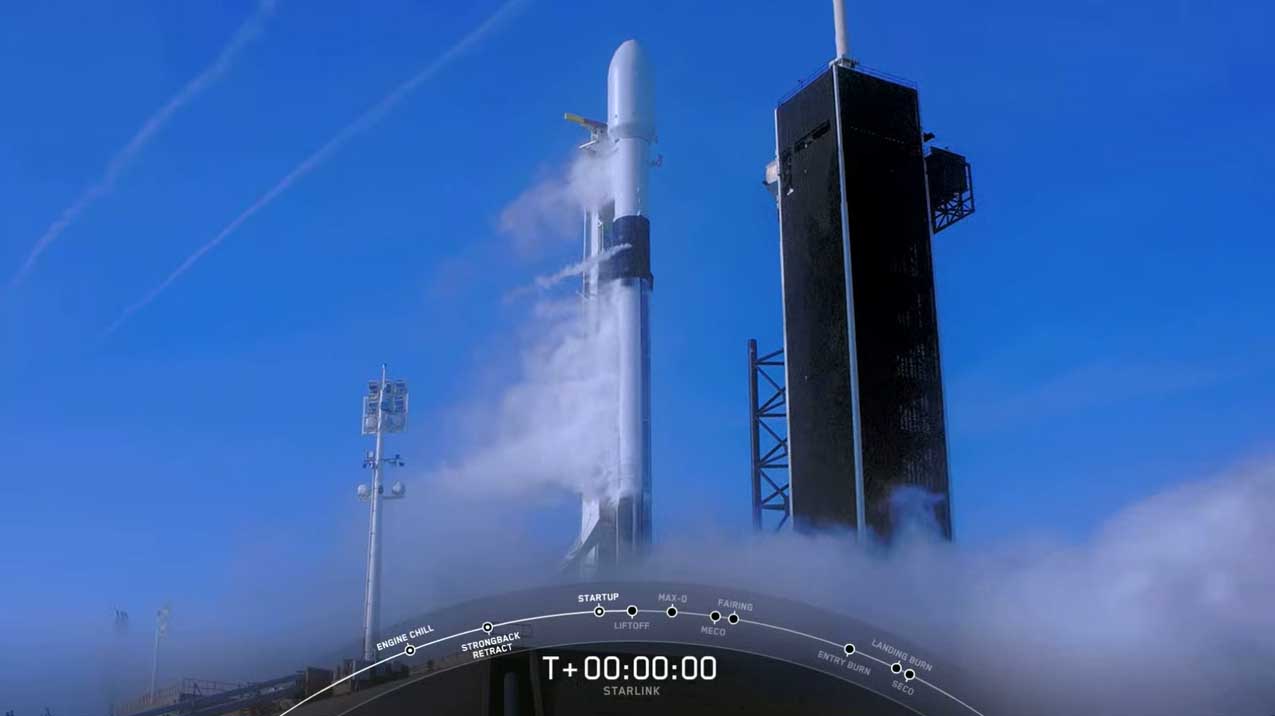SpaceX Falcon 9 rocket aborts Starlink satellite constellation launch at last second
A Falcon 9 engine power issue caused the abort at T-0 seconds.
CAPE CANAVERAL, Fla. — SpaceX aborted the launch of 60 new Starlink satellites at the last second today (March 15) due to an engine power issue with the mission's Falcon 9 rocket.
The Falcon 9 rocket's onboard computer triggered an abort just before a scheduled 9:22 a.m. EDT (1322 GMT) liftoff after detecting an issue with one of its nine Merlin 1D engines.
"Standing down today; standard auto-abort triggered due to out of family data during engine power check. Will announce next launch date opportunity once confirmed on the Range," SpaceX tweeted shortly after the abort.
The Falcon 9 first stage for this launch is a veteran SpaceX booster. The rocket has launched four flights for SpaceX. Its fifth launch for the Starlink mission would make it SpaceX's first to fly five times.
Video: Watch SpaceX's Falcon 9 abort during Starlink 5 launch attempt
The abort, coupled with an instantaneous launch window, meant that SpaceX engineers would not have time to try again today. The company is working with the U.S. Air Force and the Eastern Range, which oversee launches from Florida's Space Coast, to determine the next available launch date.
It was a foggy morning here on the Space Coast, but the skies cleared as the minutes ticked away during the countdown. The sun was shining, and everything was progressing nominally. At the T-0 mark, the final second, the Falcon 9's engines began to ramp up but quickly shut down as the abort automatically triggered.
Breaking space news, the latest updates on rocket launches, skywatching events and more!
The rocket just wasn't ready to fly.
"We had a condition regarding engine power that caused us to abort today’s launch," Michael Andrews, a SpaceX supply chain manager, said during launch commentary. "Prior to that the countdown was proceeding normally."
Standing down today; standard auto-abort triggered due to out of family data during engine power check. Will announce next launch date opportunity once confirmed on the RangeMarch 15, 2020
"Keep in mind, the purpose of the countdown is to help us catch potential issues prior to flight," Andrews added.
The Falcon 9 is equipped with safety features that can trigger an on pad abort like we saw today, and can even abort during flight if it detects an anomaly.
"There are a thousand ways a launch can go wrong, but only one way the launch can go right," Andrews said. "Given that, we are overly cautious on the ground, and if the team sees anything that looks even slightly off, we'll stop the countdown."
SpaceX test fires each of its rockets before launch. This allows the engineers to make sure the systems are functioning as expected. That routine test, called a static fire test, typically happens a couple of days prior to launch. For this mission, it was completed on Friday afternoon (March 13).
By all indications, the rocket was ready to go and cleared for flight. However, that doesn't mean that issues cannot creep up on the day of launch. If today's attempt featured a longer launch window, SpaceX engineers may have been able to troubleshoot the issue and recycle the countdown.
But SpaceX will have to wait for a new launch date and try again. In the meantime, engineers will continue to review the data and prepare the rocket for its next launch attempt.
- In Photos: SpaceX Launches Third Batch of 60 Starlink Satellites to Orbit
- SpaceX's Starlink Broadband Service Will Begin in 2020: Report
- Why SpaceX's Starlink satellites caught astronomers off guard
Follow Amy Thompson on Twitter @astrogingersnap. Follow us on Twitter @Spacedotcom or Facebook.
OFFER: Save at least 56% with our latest magazine deal!
All About Space magazine takes you on an awe-inspiring journey through our solar system and beyond, from the amazing technology and spacecraft that enables humanity to venture into orbit, to the complexities of space science.

Amy Thompson is a Florida-based space and science journalist, who joined Space.com as a contributing writer in 2015. She's passionate about all things space and is a huge science and science-fiction geek. Star Wars is her favorite fandom, with that sassy little droid, R2D2 being her favorite. She studied science at the University of Florida, earning a degree in microbiology. Her work has also been published in Newsweek, VICE, Smithsonian, and many more. Now she chases rockets, writing about launches, commercial space, space station science, and everything in between.


